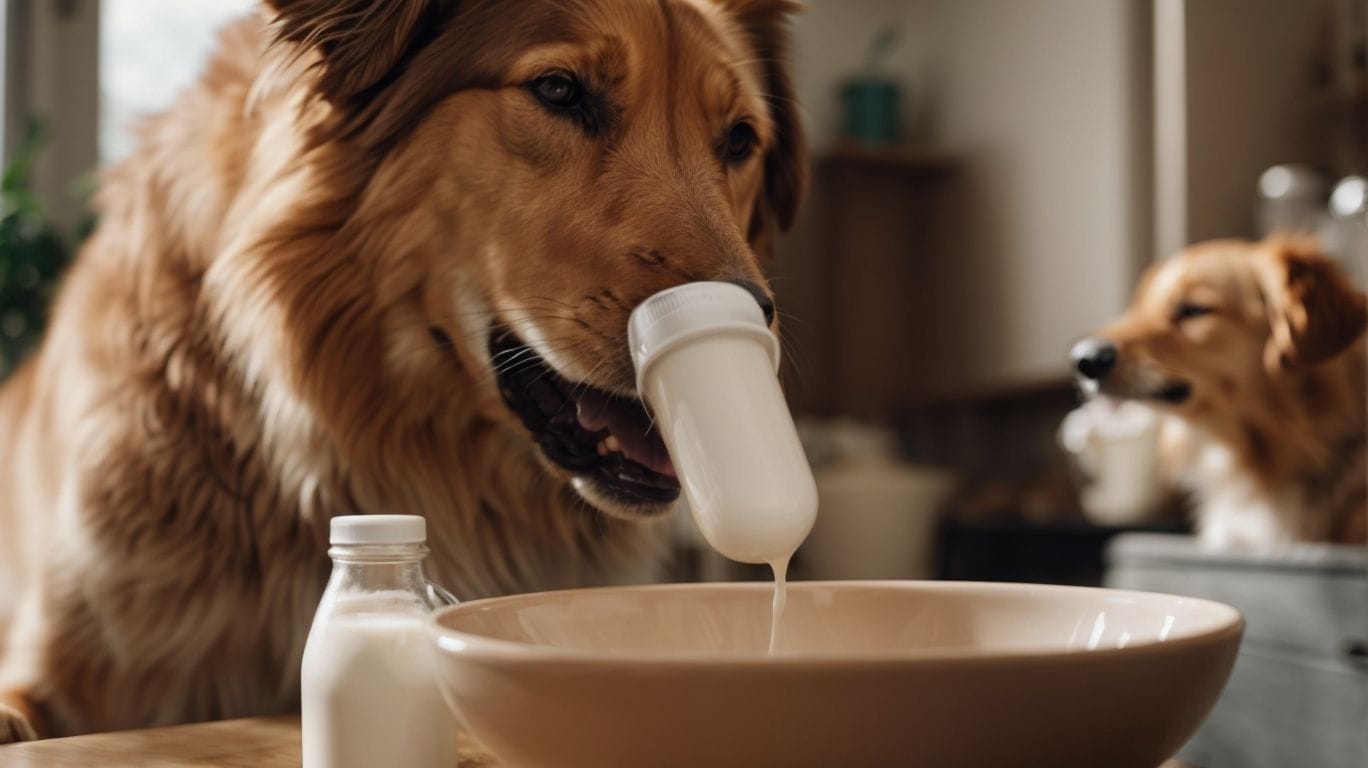Can Dogs Drink Almond Milk? This is a common question among dog owners who may be looking for alternative milk options for their furry friends. While almond milk may seem like a healthy and suitable choice, it is important to understand the potential risks and benefits of giving it to dogs.
Is Almond Milk Safe for Dogs? Almond milk is not toxic to dogs in small amounts. However, it is not recommended as a regular part of their diet. Dogs have different nutritional needs than humans, and almond milk may not provide the necessary nutrients for their overall health.
What Are the Benefits of Almond Milk for Dogs? Almond milk is low in calories and may be suitable for lactose-intolerant dogs or those with milk allergies. It is also a good calcium, vitamin E, and healthy fats source. However, it is important to note that dogs can obtain these nutrients from their regular diet.
What Are the Risks of Giving Almond Milk to Dogs? One of the main risks of giving almond milk to dogs is the potential for gastrointestinal upset. Almond milk contains high amounts of sugar and added flavors, which can cause digestive issues such as diarrhea or upset stomach in dogs. Some dogs may have allergies to nuts, including almonds, leading to adverse reactions.
What Are the Alternatives to Almond Milk for Dogs? Several alternatives to almond milk are safer and more suitable for dogs. These include:
1. Water is the best and most essential drink for dogs. It keeps them hydrated and aids in digestion.
2. Dog-Specific Milk Replacements: There are milk alternatives specifically formulated for dogs, such as lactose-free milk or milk replacers. These options provide the necessary nutrients without the potential risks.
3. Goat’s Milk: Some dogs can tolerate goat’s milk better than cow’s milk. It is important to introduce it gradually and observe for any adverse reactions.
How do you safely introduce almond milk to dogs? If you still decide to give almond milk to your dog, it is essential to do so safely. Here are some guidelines to follow:
1. Start with Small Amounts: Introduce almond milk in small quantities and observe your dog’s reaction. If there are no adverse effects, you may continue with controlled portions.
2. Observe for Any Reactions: Watch for signs of gastrointestinal upset, such as vomiting, diarrhea, or abdominal discomfort. If you notice any negative reactions, discontinue giving almond milk to your dog.
3. Consult with a Vet: Consult your veterinarian before significantly changing your dog’s diet. They can provide guidance based on your dog’s specific needs and health conditions.
Key takeaways:
- Almond milk safety for dogs: While almond milk is generally safe for dogs in small quantities, it should be given as an occasional treat rather than a regular part of their diet, as some dogs may have digestive issues or allergies to almonds.
- Potential benefits of almond milk for dogs: Almond milk can provide dogs with a lactose-free alternative to cow’s milk, containing nutrients like vitamin E, calcium, and protein. However, these nutrients can also be obtained from other sources in a dog’s diet.
- Risks of almond milk for dogs: Almond milk can be high in calories and fat, leading to weight gain and digestive problems. It may also contain additives and sweeteners that can be harmful. It’s best to consult a veterinarian before introducing almond milk to your dog’s diet.
Can Dogs Drink Almond Milk?

Photo Credits: Petnarnia.Com by Ryan Carter
Can Dogs Drink Almond Milk?
No, dogs should not drink almond milk. Almond milk is not toxic to dogs but is also not beneficial. Dogs lack the necessary enzymes to digest lactose, which can lead to digestive issues like diarrhea and upset stomach. Almond milk can be high in sugar and contain unsafe additives for dogs. Consult your veterinarian if you have any concerns about your dog’s diet.
Is Almond Milk Safe for Dogs?
Almond milk is generally safe for dogs, but is almond milk safe for dogs? It should be given in moderation. It can be a healthy addition to their diet as it is lactose-free and rich in vitamins and minerals. Some dogs may be allergic or sensitive to almonds, so it’s important to gradually introduce almond milk that is safe for dogs and watch for any adverse reactions. It’s always recommended to consult with a veterinarian before incorporating almond milk into your dog’s diet. If your dog cannot tolerate almond milk, alternatives like water or dog-specific milk replacements can be considered. Remember, a balanced diet and regularly monitoring your dog’s health should be a priority.
What Are the Benefits of Almond Milk for Dogs?
Almond milk for dogs offers a variety of benefits, including being a good source of vitamins and minerals such as vitamin E, calcium, and magnesium. It also helps in supporting healthy digestion and hydration. Additionally, almond milk is lactose-free, making it a suitable option for dogs with lactose intolerance.
However, it is essential to note that almond milk should be given in moderation and not be used as a replacement for a balanced diet. Monitoring for adverse reactions is crucial, as some dogs may be allergic to almonds. For personalized advice, it’s always best to consult a veterinarian before introducing almond milk or any new food to your dog’s diet.
To ensure your dog’s safety, always check the ingredients in almond milk and ensure it does not contain harmful additives like sweeteners or artificial flavors.
What Are the Risks of Giving Almond Milk to Dogs?
Giving almond milk to dogs can pose certain risks. One of the main concerns is lactose intolerance, as dogs lack the necessary enzymes to break down lactose. This can lead to diarrhea, stomach upset, and other digestive issues. Moreover, almond milk may contain additives like sugar, flavorings, or artificial sweeteners, which can harm dogs. Additionally, almond milk is high in fat and calories, which can contribute to obesity and pancreatitis in dogs. As a responsible pet owner, it is important to consult with a veterinarian before introducing almond milk or any other new food to your dog’s diet. This consultation is necessary to ensure their safety and well-being.
What Are the Alternatives to Almond Milk for Dogs?

Photo Credits: Petnarnia.Com by Dennis Rivera
When it comes to giving our furry friends a treat, we want to make sure it’s something safe and healthy. In this section, we’ll explore alternative milk choices for dogs. From refreshing water to dog-specific milk replacements and even the surprising option of goat’s milk, we’ll uncover the various alternatives that can satisfy your pup’s taste buds without harm. So, let’s dive into the world of dog-friendly milk options and find the perfect match for your canine companion!
Water
Water is an essential component of a dog’s diet, and it will always be available to help maintain proper hydration, aid digestion, regulate body temperature, and support overall health.
It is recommended to provide fresh, clean drinking water for dogs daily. You can incorporate water into their diet by adding it to their dry or wet food, making homemade dog treats, or freezing it into ice cubes for a refreshing treat.
Remember to clean your water bowl regularly to prevent bacteria growth and ensure that the water is always clean and fresh for your furry friend.
Dog-Specific Milk Replacements
Dog-specific milk replacements are a much better option than almond milk for dogs. These milk alternatives are safe and highly beneficial for dogs. Here is a table that showcases several alternatives:
| Milk Replacement | Benefits |
|---|---|
| Coconut Milk | Rich in lauric acid, it promotes digestion and a healthy coat. |
| Rice Milk | Easily digestible and suitable for dogs with allergies or sensitivities. |
| Oat Milk | It provides fiber, vitamins, and minerals and supports digestive health. |
| Bone Broth | It is protein-rich, supports joint health, and boosts the immune system. |
| Goat’s Milk | It contains natural enzymes, is easily digestible, and is beneficial for gut health. |
Ensure your furry friend’s health and prevent potential risks by selecting these dog-specific milk replacements instead of almond milk.
Goat’s Milk
Goat’s milk is a highly regarded and widely used alternative to almond milk for dogs. This nutrient-rich beverage offers numerous advantages and is generally safe for most canines. Due to its easy digestibility, it is particularly suitable for dogs with sensitive stomachs. Additionally, goat’s milk is packed with essential vitamins, minerals, and proteins, making it a fantastic source of nutrition. It also contains beneficial probiotics that aid in maintaining healthy digestion and supporting the immune system. To introduce goat’s milk to your dog, it is recommended to start with small amounts and carefully observe for any possible adverse reactions. As always, it is essential to consult with your veterinarian before making any significant dietary changes for your furry companion.
Historically, goat’s milk has been consumed by both humans and animals for thousands of years. Its rich nutrient content and immunity-boosting abilities led to the belief that it possessed medicinal properties. Ancient civilizations highly valued this milk as a beneficial source of nutrition, particularly for infants and those with lactose intolerance. Even today, it remains a popular choice among individuals who prefer natural and wholesome alternatives to cow’s milk.
How do you safely introduce almond milk to dogs?

Photo Credits: Petnarnia.Com by Donald Carter
Are you looking to introduce almond milk to your furry friend? Let’s dive into the safe ways of doing it. We’ll discuss starting with small amounts and closely observing any reactions. So, grab your almond milk and ensure a smooth and enjoyable experience for your dog!
Start with Small Amounts
- When introducing almond milk to dogs, it is crucial to start with small amounts and closely monitor their reaction to it by gradually mixing a small amount of almond milk with their regular food or water.
- Observation: Keep an eye out for any signs of digestive issues or allergies, such as vomiting or diarrhea, while gradually introducing almond milk.
- Vet consultation: Before introducing almond milk, consult a veterinarian for guidance based on your dog’s needs and health conditions.
By following these steps and starting with small amounts, you can ensure your dog tolerates almond milk well and avoids potential risks or adverse reactions.
Observe for Any Reactions
When introducing almond milk to dogs, it’s crucial to conserve for any reactions. Please give them a small amount and closely monitor their behavior, observing any reactions. Look for signs of stomach upset, diarrhea, or allergic reactions like itching or swelling. It’s important to understand that dogs may have difficulty digesting almond milk due to its lactose content. If any negative reactions occur, discontinue giving almond milk and consult with a veterinarian to observe for any reactions. Always prioritize your dog’s well-being and consider alternative options like dog-specific milk replacements or goat’s milk, which may be more suitable for their digestive system.
My friend once gave her dog almond milk without observing for any reactions. Unfortunately, the dog was allergic and had to be rushed to the vet. It was a lesson learned, reminding us of the importance of being cautious and observant when introducing new foods to our pets.
Consult with a Vet

Photo Credits: Petnarnia.Com by Paul Harris
When giving your furry friend almond milk, it’s crucial to consult with a vet. Don’t worry; we’ve got you covered in this section. Discover the top tips to remember when introducing almond milk to your dog, starting with small amounts and closely monitoring their reactions. Your pup’s health and well-being are of utmost importance, so let’s delve into the expert advice to ensure they stay happy and healthy.
Some Facts About Dogs Drinking Almond Milk?
- ✅ Almond milk is generally considered safe for dogs but should be given in moderation. (Source: Our Team)
- ✅ Almond milk is high in calories and not recommended for regular dog consumption. (Source: Our Team)
- ✅ It is important to check the ingredients of almond milk to ensure it does not contain Xylitol. (Source: Our Team)
- ✅ Xylitol, if present in almond milk, can be toxic to dogs and can cause hypoglycemia, liver failure, and even death. (Source: Our Team)
- ✅ Symptoms to watch for if your dog has consumed almond milk with Xylitol include vomiting, lethargy, seizures, and weakness. (Source: Our Team)


